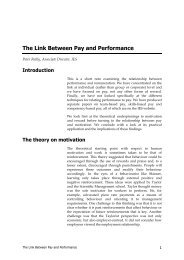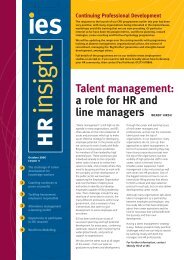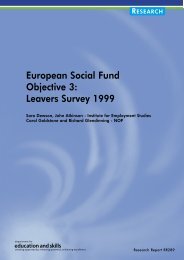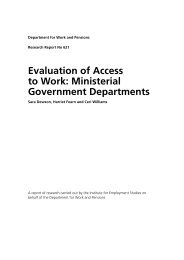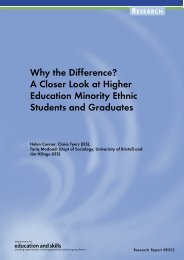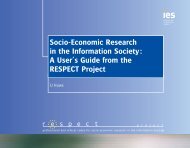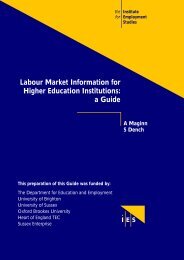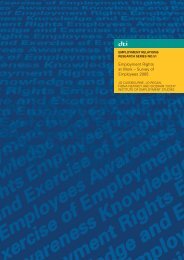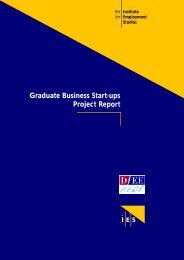Post-16 Transitions: a Longitudinal Study of Young People with ...
Post-16 Transitions: a Longitudinal Study of Young People with ...
Post-16 Transitions: a Longitudinal Study of Young People with ...
You also want an ePaper? Increase the reach of your titles
YUMPU automatically turns print PDFs into web optimized ePapers that Google loves.
In some cases, school embodied the best <strong>of</strong> ‘traditional’ special<br />
education. Sophie1 for instance, is a young woman <strong>with</strong> severe<br />
and complex learning difficulties who was 18 at the time <strong>of</strong><br />
interview, but had attended the same small special school since<br />
the age <strong>of</strong> five. Her mother described the school in the following<br />
terms:<br />
“I mean it’s a very good school, we think it’s a very good school.<br />
The head teacher is exceptional and we’re not alone in saying that<br />
you know. She is very good <strong>with</strong> staff and cheerful and <strong>with</strong> the<br />
County Council so I think we’ve been very lucky there.”<br />
This ‘exceptional’ head was able to <strong>of</strong>fer the sort <strong>of</strong> personalised<br />
support which young people and their families needed. In this<br />
context, the formal processes <strong>of</strong> review and planning simply<br />
formed part <strong>of</strong> a close and continuing stream <strong>of</strong> interaction<br />
between school and family.<br />
Sophie’s difficulties present significant educational problems to her<br />
teachers, but ones that are well-understood and can be met by a<br />
committed staff. However, young people who present behavioural,<br />
emotional or social difficulties appear to be much more difficult for<br />
teachers to deal <strong>with</strong> and these young people face the real threat<br />
<strong>of</strong> a breakdown <strong>of</strong> the relationship <strong>with</strong> school. Carl is a young<br />
man <strong>with</strong> severe autism who attends the sixth form <strong>of</strong> a special<br />
school for pupils <strong>with</strong> moderate learning difficulties. As he entered<br />
the teenage years, he began to present acute behavioural<br />
problems in terms <strong>of</strong> violence to family, teachers and other pupils.<br />
He also began to engage in sexually inappropriate behaviour. The<br />
school was on the point <strong>of</strong> excluding him and was only dissuaded<br />
from doing so when it secured extra funding from the LEA to<br />
provide one-to-one support. As Carl’s needs have eased, he has<br />
remained in the school post-<strong>16</strong>, and at the time <strong>of</strong> interview was<br />
attending a link course at a local FE college <strong>with</strong> which the school<br />
had a good working relationship. Plans were already in place for<br />
him to complete the transition to the college full-time in the<br />
following year.<br />
However, not all such problems had equally positive outcomes. A<br />
number <strong>of</strong> young people we spoke to had had somewhat turbulent<br />
school careers, particularly in the latter stages where their difficulties<br />
and frustrations reached crisis point. Matthew, for instance,<br />
described himself as having dyslexia, though it appears to have<br />
been his behavioural difficulties which caused the greatest problems<br />
for his teachers. After an unsuccessful time at primary school, his<br />
difficulties were identified by his secondary school. He was not<br />
regarded as having sufficiently severe problems for the school to<br />
seek a statement, but he nonetheless received a level <strong>of</strong> support<br />
which both he and his mother regarded as valuable. Despite this,<br />
Matthew found relationships <strong>with</strong> his teachers and his peers difficult.<br />
He was bullied and himself became a bully in turn. He misbehaved<br />
in lessons and was given to outbursts <strong>of</strong> temper in which he might<br />
hit other pupils. The school’s approach was supportive, but as his<br />
SEN teacher told us, ultimately it was ineffective:<br />
1 All names have been changed to protect the identities <strong>of</strong> the<br />
young people who took part in the case studies.<br />
52 <strong>Post</strong>-<strong>16</strong> <strong>Transitions</strong> <strong>of</strong> <strong>Young</strong> <strong>People</strong> <strong>with</strong> SEN: Wave 2



